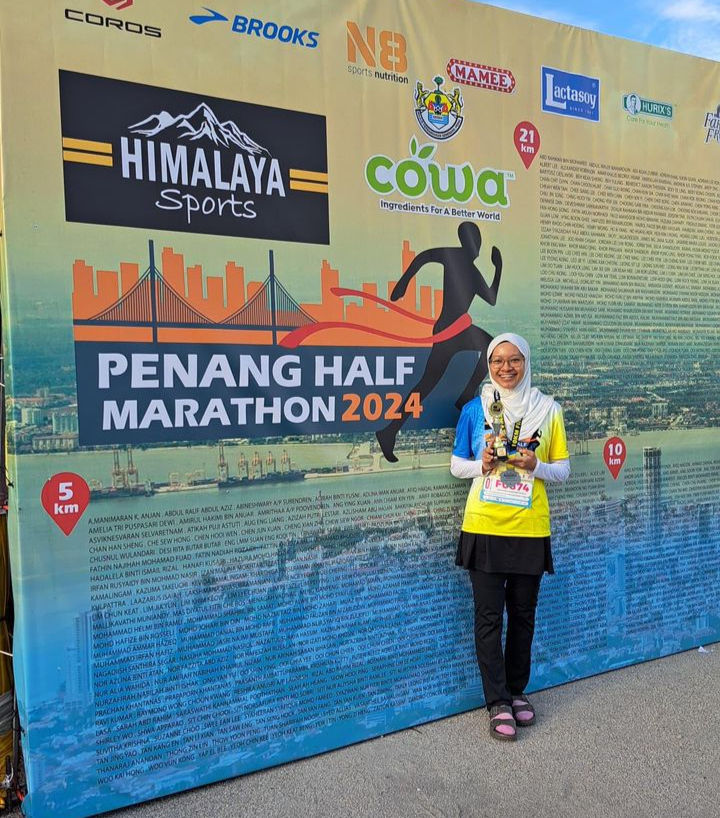Running as Remedy
- charismamovement
- Nov 23, 2024
- 5 min read
Fueled by a passion for fitness and the pursuit of endurance, young runners are flocking to races and marathons around Klang Valley. Despite having only a few months left in 2024, the number of running events in KL remains high. We interviewed several dedicated individuals to understand their motivation for taking on such a daunting sport and how running has transformed their lives.

Meet the new generation of runners who took up the sport with total dedication in a post-pandemic world. Among them is 26-year-old Khairina, who started running with the hope of maintaining the same energy at 62 as she has today. For Raihanah, a 26-year-old working professional, running began as a way to curb the monotonous pace of jogging; today, it’s become her new addiction and a way to continuously challenge herself. And then there’s Wafaa, 26, a young engineer who turned to running last year as a way to detox both her body and mind—a source of free therapy.

While many Malaysian runners might start young, we also often see new participation arising from different age groups. For the case of our interviewees, they are also relatively new to running events—some only started after the Movement Control Order (MCO) was lifted, while the rest joined the sport actively within the past year. On that note, it seems that social isolation during the pandemic has pushed a great many to prioritise physical activity for their well-being. Although home workouts and exercise became increasingly popular, it was only natural for people to eagerly embrace outdoor sports as part of their return to normal life once the MCO was lifted.
Other than to stay fit and lose weight, running has notably become a way to cope with life's hurdles. Take Man and Syahmi, both 26, for example, who described the sport as their form of escapism and an outlet for stress relief. These feel-good experiences after a run could be attributed to the increased level of norepinephrine, a chemical that helps regulate the brain and body’s response to stress. Health reports have also shown that running boosts endorphins, brain transmitters that act as natural pain relievers and mood elevators, further alleviating stress and providing a sense of relief. With all these intrinsic benefits, it’s no surprise that the sport serves as a form of escapism—or even a lifeline—for these youngsters.
To truly harness the power of running, preparation must be solid and intentional. A week before a race, Raihanah shared that she reduces her mileage as part of her preparation. 'Less mileage, less injury, less pressure,' she added. Additionally, Khairina highlighted the importance of training for maintaining a strong mental game. 'I think how I mentally prepare is by reminding myself that I’ve trained well,' she said. Wafaa, by contrast, relies on positive self-talk. 'I keep telling myself, "Just do what we practised,"' she explained. 'I always remind myself of the words of gymnastics Olympian Suni Lee, who said, "Your normal is good enough."' Meanwhile, our male interviewees, Syahmi and Man, emphasised simple yet crucial steps to their marathon preparation: keeping the body well-rested through adequate sleep and proper hydration.
When it comes to meals, the runners each have their own strategies for fueling before, during, and after a race. On the day of a race, most emphasised on only having light meals for sustained energy, with Man preferring milk and half-boiled eggs, while Khairina opting for black coffee and a banana. During the race, quick sources of energy and hydration like energy gels or plain water are key. Raihanah shared that she takes energy gel 30 minutes into her run and drinks mineral water from the water station. After the race, recovery meals are important, with Wafaa and Syahmi prioritising protein-packed options like protein powder and Nasi Kandar to aid muscle recovery. These approaches reflect the runners’ individual needs while demonstrating the universal importance of nutrition in endurance sports.

Like any sport, running has its ups and downs. We asked our runners about their experiences with injuries, fatigue, and self-doubt, and how they overcame these physical and mental obstacles. Raihanah shared how she once struggled with foot pain after a long run due to the extra pressure on her flat feet, but she managed to pull through by using Kinesio tape for support and avoiding overexertion. Syahmi, on the other hand, faced extreme body fatigue that sidelined his performance. He highlighted how fully resting for a week or two was key to his recovery process.

For Khairina and Wafaa, the challenge wasn’t physical but mental. They confessed to feeling bouts of restlessness, unmotivated, and 'easily swayed by emotion’ to the point of giving up during races, which forced them to take a step back, tune into their bodies, and understand their physical limits. Eventually, they learned to manage these mental challenges through positive reinforcement and visualising success at the finish line. The resilience shown in facing their unique challenges proved their undying commitment to their goals, demonstrating that overcoming both physical and mental hurdles is just as important as completing the race itself.
Despite the challenges they faced, the sweet taste of victory made it all worthwhile in the end. Our aspiring runners have shared some of their biggest achievements and memorable experiences that highlight their personal growth in the sport. Khairina recalled tearing up as she approached the finish line of her first 10K event, moved by the cheers of the crowd. It was a significant milestone for her, marking the start of her journey as a marathoner. For Raihanah and Wafaa, earning a spot on the podium was their proudest achievement in running. Placing in the top 10 had never crossed their minds before, as neither had reached such a milestone nor considered themselves professional athletes.



Meanwhile, Syahmi fondly recalled a memory of training with his friends in the scorching midday sun, which left them dehydrated on a highway, all driven by a sudden obsession with joining Ironman Malaysia. He added that overcoming his laziness to train has been his greatest personal achievement. On the flip side, Man highlighted that joining the running community and achieving 3 minutes per kilometre pace in a short time remains his most memorable and proudest running accomplishment so far.
When asked about their advice for newcomers to the sport, the runners emphasised the importance of taking the first small step by simply starting to run. Wafaa explained that it is crucial to first develop the habit of showing up to maintain discipline, regardless of emotions. ‘Do it lazily, do it scared, do it with what you have at the moment,’ she encouraged. Syahmi expressed that consistency is key, explaining, 'Run slow to run fast.' Man also echoed this sentiment by quoting the Chinese philosopher Lao Tzu, 'The journey of a thousand miles begins with a single step,' advising beginners that you won't get anywhere unless you take the first step.

Their insights reflect lessons learned from their running journeys and the wisdom gained through both wins and losses. The mental strategies employed by our interviewees in the sport can be applied by anyone, in any aspect of life, regardless of where you are in your journey. These dedicated runners are a testament to the sport's ability to cultivate not only physical fitness but also a lifelong commitment to holistic wellness and personal growth. In other words, running not only can add days to your life, but also life to your days.
By,
Marsya Mahfis,
Journalist,
Charisma Movement 23/24.



Comments